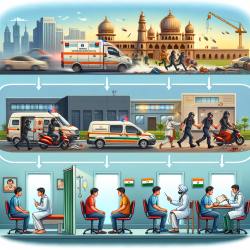Understanding PTSD in Post-Road Traffic Accident Patients: Key Insights and Guidelines
In the bustling streets of India, road traffic accidents (RTAs) are an unfortunate yet frequent occurrence. The World Health Organization (WHO) has projected that by 2020, RTAs will become the third leading cause of global disease burden. With India accounting for nearly 10% of the world's RTAs, the psychological aftermath, particularly post-traumatic stress disorder (PTSD), is a growing concern. A recent review article titled "PTSD in post-road traffic accident patients requiring hospitalization in Indian subcontinent: A review on magnitude of the problem and management guidelines" sheds light on this pressing issue and offers insights into potential management strategies.
The Magnitude of the Problem
The review highlights the significant impact of PTSD on RTA survivors, noting that psychological issues often go unaddressed in emergency settings. This oversight can lead to adverse effects on quality of life and work productivity. The financial implications are severe, with hospital expenses and loss of income creating a cycle of financial difficulties for trauma victims.
The review conducted a comprehensive search across major databases, identifying six studies that met the inclusion criteria. These studies underscore the need for timely psychological interventions to prevent long-term consequences.
Proposed Management Guidelines
The review proposes several management guidelines aimed at improving outcomes for RTA victims:
- Coordinated Triage: Establishing a coordinated triage system to facilitate prehospital transfer and psychological care in trauma units.
- Screening Tools: Implementing screening tools in emergency departments (ED) to identify patients and families at risk for PTSD.
- Psychological Counseling: Providing psychological counseling at all trauma centers and hospitals dealing with RTA victims.
- Work Potential Profile: Utilizing the 'work potential profile' scale to assess the productivity of post-RTA PTSD patients.
- National Healthcare Policy: Establishing a national healthcare policy to provide financial support to post-RTA PTSD patients.
Encouraging Further Research and Implementation
For practitioners, the insights from this review are invaluable. By integrating these guidelines into practice, healthcare providers can significantly enhance the quality of care for RTA victims. Furthermore, the review encourages further research to explore the efficacy of these interventions and develop more comprehensive strategies.
Practitioners are urged to remain vigilant in recognizing the signs of PTSD and to advocate for the implementation of these guidelines within their institutions. By doing so, they can play a pivotal role in mitigating the psychological impact of RTAs and improving patient outcomes.
To read the original research paper, please follow this link: PTSD in post-road traffic accident patients requiring hospitalization in Indian subcontinent: A review on magnitude of the problem and management guidelines.










